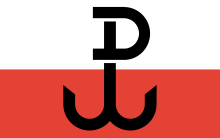
Why the Poles Fight, part 3
They were young, desperate, and had seen enough of German savagery. They wanted to be free and wanted to avenge the unspeakable brutality of the invaders. They knew they could die, but also knew there are worse things than death.
But the youths of Warsaw weren’t the only players in this crucial moment of the Polish history.
There were their superiors, the commanders of the Polish Home Army. They were the ones who gave the orders to start the fighting.
There was a Polish government in exile, in London.
Then there were three powers fighting war in Europe––Britain, the United States and Russia.
Unbeknownst to most Poles, the fate of their country was decided already at the end of November 1943, in Tehran. There, Roosevelt and Churchill didn’t resist Stalin’s takeover of the Polish land and gave up any fight for our freedom. Churchill initially fought for Polish independence, but without support from the American president, couldn’t do much. By the time of the next meeting, in February 1945, in Yalta, the Russians were on the outskirts of Berlin, and no negotiations would change the ironclad Stalin’s will to dominate Eastern Europe.
The decisions from Tehran were withheld from the Polish government in exile, and, of course, weren’t known in Warsaw. The Russians had already been guaranteed Polish Eastern lands, in exchange for of giving back German Eastern territory to Poland, and with a sly smile on their faces promised a free election after the war. Historic, massive resettlement of the population in Eastern Europe had been already in the works. The plans included repatriation of the Poles exiled by the Soviets to Siberia.
Meanwhile, in Warsaw, the Home Army was getting ready to rise. Poles wanted to participate in the liberation of their country. Little did they knew their fate was doomed from the start. Roosevelt gave in to Stalin’s demands, but wanted to keep it secret. The American elections were approaching, and he didn’t want to lose the votes of the large Polish population in the United States. Churchill and de Gaulle, more or less openly washed their hands of the controversy. Gen Sikorski, Prime minister of the government in exile, was convinced neither the United States nor Britain would do anything without consulting him. He soon died in a mysterious plane crash near Gibraltar. In Warsaw, everybody was convinced this time in history our allies will help. Neither Britain, nor France, did at the start of WW ll. Churchill was aware of the tragic miscommunication, and sent his confidante, Retinger, to get the first-hand information about the situation in Warsaw.
Józef Retinger was quite a unique figure in the world around the turn of the century. Born in Cracow, after a short stint with Jesuits, at the age of 20 got a doctor of literature degree from Sorbonne. While in France, he helped to organize the Polish army to fight Soviet invaders in 1920. On Russians demand, France expelled Retinger, who left for Spain, and eventually ended in Mexico, where he advised its President during the Mexican Revolution. From there, he moved to the United States, where he was awarded citizenship of recently reborn Poland. After WW ll broke out, and the fall of his native country, Józef Retinger landed in London, where he became a part of the Polish government in exile. Later, he cooperated with Soviet Russia on forming the Polish armed forces in that country, and was part of the Polish diplomatic team working on reestablishing Polish-Soviet relations, broken off after the Soviet invasion coordinated with the German attack in 1939.
So, it was of no surprise when Churchill, wanting to find out the sentiments in Warsaw before the anticipated Uprising, sent Retinger there. He found out that the mood there was upbeat, people were ready to fight, but his warnings about the British position of non-intervention were dismissed. To complicate Retinger’s position, his previous cooperation with the Russians brought the suspicion Retinger was a spy for Moscow. The emissary was almost poisoned and barely survived. Later, he worked on creating a united Europe, got nominated for a Nobel Prize, and died in London.
The Polish government in London, not being able to effectively communicate with Warsaw, left the final decision to start fighting to the command of the Home Army in Warsaw. So, as it had happened many times in the history of wars, once put in motion, a massive train loaded with hatred towards the Germans couldn’t be stopped. The barrel with gunpowder had to explode. The decision to start the Uprising was made in Warsaw independently of London on the erroneous assumptions: that Soviets tanks entered the right-bank of Warsaw, that Soviets would help based on a deceiving broadcast from a Polish language section of Radio Moscow promising support, on the conviction that Allies will help, and that the Germans are demoralized in face of war nearing its end. The Polish prime minister in London wanted to fight. His commander of the Polish Armed Forces in exile disagreed, and as a result, was demoted. He soon after left for Canada.
After the fighting broke out, the Soviets didn’t move a finger. Desperate action by the Polish division didn’t receive any support by the Soviet command. The fights, which the Polish commander expected to last three days, took sixty-three days. Sixty-three days of systematic slaughter. All this time, the Soviets watched from the right bank of the Vistula. Resting.
The Warsaw Uprising was the single largest military effort of resistance during WW ll in Europe. The street battles were compared to fights in Stalingrad. It was also the biggest miscalculation. The price paid by the city was mind-boggling.
The victory in Warsaw was seen by Himmler as a revenge for the Poles beating the Germans in the battle of Tannenberg in 1410. On his order, Warsaw had to be erased from the surface of Earth.
So, during WW II, our allies betrayed us twice. But the hardest felt slap in Polish faces was however their absence in the victory parade in London. This ‘honor’ was given to the Polish armed forces under Soviet command during the parade in Moscow.
But there was another group of the participants in the Warsaw Uprising. They didn’t have any voice. They were the ordinary citizens of our capital city. They suffered the biggest blow of German reprisals.
How the decision was made.
[embedyt] https://www.youtube.com/watch?v=8JXr14M_Vzo[/embedyt]
6 Comments
It is obvious to me that the history I have learned is based on who has been writing it. To note, I was led to believe that Churchill and Stalin had a secret understanding that Russia would take control of Poland but they did not let Roosevelt know based on the American ideology of rejecting colonialism and occupation. It is interesting to read your history from “on the ground” as it were. Thank you for your informative writings.
Thanks, Gerald. Your knowledge of the events from my part of the world is much better than most of the Americans. You can be proud of your education.
While there much said about the great deeds performed by America during WW2 there is another side that is shameful. How the countries failed their responsibility to oversee Germany after WW1 and the formation of the League of Nations which the US Congress refused to buy into. The US public had to be convinced to go to war so a Naval Intel officer raised in Japan gave FDR a list of what had to be done to provoke Japan into making the first strike. Then the leasers in US media refused to acknowledge the truth of Germany’s murderous concentration camps. By the time of Yalta and meeting in Tehran FDR was in poor health and too weak in negotiations with Stalin. He and Eleanor thought of Stalin as kindly uncle Joe. FDR was further compromised by his vice president (Wallace 1941-45) who was a communist sympathizer. What the US agreed to give to Stalin was shameful and criminal. Eastern Europe was needlessly made to suffer for many decades. As in most every war the US has been part of in the last 115 years it is the military industrial complex that has done quite well for itself. The general public loses large numbers children and gets higher taxes as insult to injury.
You are the writer who keeps the truth of history alive. For we must not allow a rewrite of the details which would lead us down the path to another waste of human life and let our leaders get a pass for their misdeeds.
Good words. Thanks, Rob.
Good stuff. I love real history. This and other examples of American citizens’ and our governments’ failure to stand up for our stated values and beliefs was stunning then just as today’s examples are.
Thanks, Bob.Your opinion means a lot.